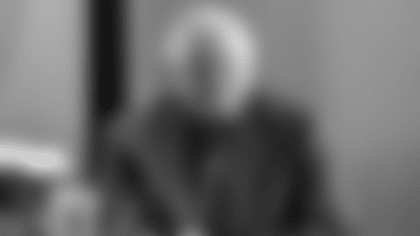Jason Garrett is about "The Team." The alter ego he has developed for the media and press conferences, that's for the team, to make sure he never gives away a single word of information that could help the enemy. His persona is also there to protect the coaches and players. His team.
The 18-hour days for 11 months of the year that he really wishes no one knew about or spoke of, that's for the team. Every advantage, every minute of film he watches, every one-on-one meeting he has, the relationships, the trust, it's for the team. The YETI tumblers handed out at training camp read simply:
The Team
The Team
The Team
Garrett has spent a lifetime on teams, starting with his own family growing up, seven siblings, and including himself, all less than eight years apart, often moving every year for his father's most recent coaching gig. His leadership was obvious from the get-go. He was the kid organizing teams at recess in first grade while half of them were picking their nose or digging a hole in the dirt. He played all of those leadership positions, too: point guard, shortstop and quarterback.
For decades, to this very day, Garrett refers to the neighbor at his family's longtime homestead in New Jersey as the enemy because the guy would always complain, yell and scream about the footballs and baseball coming into his yard. Never mind that the man passed away several years ago; his son is even more of a pain in the you-know-what. Don't mess with Garrett's team, be it his family, friends, teammates or players.
The first time I ever spoke with Garrett was in February 2010. I mentioned something about Michael Irvin, Emmitt Smith and Troy Aikman being such high-profile players when he was a backup quarterback on those Super Bowl-winning squads of the 1990s. He immediately went into defense mode, going on for almost five minutes about what incredible teammates they were and how they never put themselves above anyone else. It took me years to understand his reaction because my comment wasn't meant as a knock on "The Triplets" in the least.
It was about The Team. Those were his teammates. Not former teammates, for there is no such thing for Garrett. And he would always have their backs. Today, tomorrow and forever.
For Garrett, it's really about a way of life. This isn't just about how he coaches a football team. It's how he was brought up, and it's how he has spent a lifetime trying to take the best from all of those he encounters. This is the Garrett Way.
After three straight 8-8 finishes, which in retrospect were really rebuilding years in which the Cowboys still managed to be competitive, the talent caught up with the team chemistry for a magical 12-4 finish in 2014. This past season was more of the same, top-seed in the NFC, 13 wins and by all accounts a team atmosphere and chemistry that almost to a man, players and coaches said was unrivaled in their experience.
As for the 2015 campaign, well, that was another story entirely, the most disappointing in franchise history. The NFC Super Bowl pick for many finished 4-12, and while it allowed Dallas to draft Ezekiel Elliott with the No. 4 overall selection, the season itself was a nightmare.
And it was about so much more than Tony Romo's injuries. As the world found out this past year, the Cowboys are more than capable of winning with another quarterback.
The same team chemistry cited for playing such a role in 2014 and this past season was simply not the same in 2015. And as Garrett explained, when a team doesn't have one another's backs, they tend to fall apart in the final minutes of close games.
There is no need for specific names. It's just important to understand who this team was and is, and more importantly at this point, who this team must remain to be successful going forward.
"We made some moves in 2015 with the hope of them adding value to our team, and at the end of the day, the chemistry just wasn't the same," said Garrett. "We were all responsible for what took place in 2015, but when you are having some struggles as a team, and everyone is not on the same page, the culture of the team is altered.
"Here's what we needed to do to change the culture. And here's what we need to do going forward to keep that culture we had in 2014 and again this past season. We need to have guys who love to play football and love being great teammates. We need to build a team that every single person associated with the team can be proud of. We need a healthy team culture where people hold one another to a high level of accountability. We need guys who believe in what we're trying to do."
At the conclusion of the 2015 campaign, several prominent players told Garrett point-blank in their exit interviews that the team needed to move away from the few who were causing the issues. The Cowboys were headed in that direction anyhow, but the players' input only further validated the organization's mindset entering the offseason.
"That leadership from within doesn't always happen," Garrett said. "That illustrates how things needed to change. We, as a team and as an organization, had to say, 'Look, there's this ideal we believe in, and we've been building.' We've been laying the seeds here since 2011, and if someone is trying to go in another direction, we need to say, 'Hey, we're not doing it that way.'
"I think we, from the perspective of ownership, the front office and the coaching staff, couldn't be happier and more proud at the kind of team chemistry the Dallas Cowboys had this past season. We had the right kind of players. Guys who wanted to fight every single moment of the season.
"But there's a different kind of player. Those who want to believe whatever it is they want to believe, regardless of the team concept, regardless of the team mindset. And we learned firsthand that it's hard to live in a world with that kind of player."
It had been a whirlwind three weeks, beginning with the heart-wrenching divisional round loss to Green Bay and concluding with a magical night in Houston on the eve of Super Bowl LI when Jerry Jones was elected to the Pro Football Hall of Fame and Garrett was named NFL Coach of the Year.
There was also the task of coaching the NFC Pro Bowl squad in Orlando. Of course, that was the last place he wanted to be on the second-to-last Sunday of the season because that meant the Cowboys wouldn't be playing seven days thereafter.
The emotion in the locker room following the defeat to the Packers was raw and uncontrollable with, by several accounts, at least half the players crying. Both Stephen and Jerry Jones Jr. exited the locker room with tears in their eyes. This was a team that came together at training camp and developed a camaraderie few could ever remember experiencing. They challenged one another and raised the bar of expectations throughout the season, to the point that only a Super Bowl victory would have sufficed.
"It was a challenging situation. Everyone in that locker room put so much of themselves into this team the last nine or 10 months. You try and process the emotions the best you can," Garrett said. "There were a lot of tears, no question."
There wasn't much sleep that night for Garrett, who like most coaches and players had friends and family in town for the game. They stayed up talking, his company understanding that he had zero interest in discussing the game.
After trying to close his eyes for a few hours he headed to the team's practice facility in Frisco. Anticipating an NFC Championship Game, the week's plan was already in place, so Garrett had to adjust on the fly, calling for a team meeting at noon. There were also physicals and exit meetings with position coaches, coordinators, and Garrett himself met with every player over the next three days.
The staff also graded the game, although Garrett admits it was a quicker process than usual.
"We kind of took a breath. 'What happened here? What did we do well? What could we have called differently?' Take an account of it all, share our thoughts, go around the room, but yeah, in an abbreviated fashion than what we usually do," Garrett said. "There was still so much emotion. I can't imagine ever watching that game and not feeling that emotion."
Garrett watched the conference championship games and the Super Bowl, even caught the final minutes of the Pittsburgh-Kansas City game that was played after the Packers-Cowboys classic.
"I understand those who didn't watch," Garrett said. "I appreciate that thought process of it being too painful because those were the games we wanted to be playing in. But I watched just to kind of see who played well."
While the fan base and media were obsessed for the better part of three months on who should be taking the snaps for the Cowboys, Garrett wasn't. In his world, especially during the season, it's day-to-day, game-to-game. It's not, Will Tony Romo be the starting quarterback two months from now? That's just not how his mind works. It's a hypothetical.
The reality was Dak Prescott was the starter, and they were trying to prepare him for each game as best they could.
Also, there was never a sit down with Jerry and Stephen Jones, Garrett or anyone else, where they went around the room and talked about it. Not even as Romo was ready to return later in the season. Heck, Garrett himself hadn't even made any announcement publically when Romo, who had been told at this point, surprised one and all with his press conference saying that Prescott deserved to be the starter.
"Tony wasn't healthy for eight, nine, 10 games, whatever it was, so there was really nothing to discuss," Garrett said. "When Tony got back to practicing, and he was trying to get back to 100 percent, there wasn't a decision made at that point. We had won 11 straight games, which certainly made it a challenging situation. We couldn't disrupt that intentionally.
"When I spoke with Tony and told him the direction we were going, I told him that this really had little to do with him. It was more where we were as a team. What I mean by that is that Tony did his part to return as the starter. He won 16 of his last 21 starts and looked great at camp.
"It's just that Dak responded again and again to any adversity that came his way. He really didn't give us a reason to make a change."
When Romo gave his statement to the media on Nov. 15, Garrett was told a few minutes beforehand and listened. He was impressed with the candor, and felt Romo's words were genuine and authentic. The head coach also thought it was important the two of them talk again, which they did the following day.
"It was important to me, the idea of, OK, now you're back and ready to play, and you've publicly supported Dak, so there's a different role for Tony now. It's time to buckle down and be ready to play," Garrett said. "The situation was going to be much different for him in terms of preparation, reps, than in the previous 10 years. I was glad he was behind us, and now it was time to get to work for the importance of the team. I think there were things we both needed to get off our chest."
As for the relationship between Garrett and Romo, well, that's impossible to gauge. The two have been close since the former joined the Cowboys as the offensive coordinator in 2007, the season after Romo earned the starting gig. They have spent time together away from football, too, often attending college basketball games. This wasn't just a coordinator and then a head coach having a bond with his player. It was more. It was a friendship. And it's hard to imagine that not continuing to be the case.
There's no reason for anyone with the Cowboys, be it Jerry Jones or Garrett himself, to announce here and now that Romo won't be returning next season, but everyone understands the reality of the situation. Never mind the $25 million price tag on a backup quarterback. It's just time. It's time for a fresh narrative. It's time to focus on the team rather than who is or isn't, who should or shouldn't, be taking the snaps.
"I hope what happened this season doesn't change our relationship. I would hope it was strong enough to withstand this," Garrett said. "We're working through the situation right now. It's still unresolved. And, yes, Tony hasn't always agreed with the decisions that were made this year, but I think he knows they were well intended. I think, I hope, he understands the decision was what we thought was best for the team.
"Looking back, the logistics of the situation, Tony not really being around when he was on injured reserve – he was focused on his rehab and healing – and me being locked in on our games, our relationship was different than most of our seasons here. I know this year wasn't easy on him. I know it was tough. He's such an accomplished player, and he's healthy and not starting."
At the conclusion of the first practice of the team's 2016 training camp in Oxnard, Calif., Garrett grabbed Prescott, his rookie third-string quarterback, as he walked off the field and asked him to play catch. He had noticed something in his throwing motion that needed a minor adjustment, an issue that Garrett struggled with early in his own pro career.
After tossing the ball back and forth for a few minutes, Garrett told Prescott about a cool-down process he used to do at the conclusion of his NFL practices back in the day, which consists of three throwing contests.
For starters, they would stand 15 yards apart, playing catch. Two points for any toss that would hit the other in the face, one point for anything directed at the torso. Depending on time, they played to 11, 15 or 21 points.
Next up, they would move to a distance of 25 yards, best two of three, whoever threw the better pass, based on turning the ball over, accuracy, how tight the spiral was and how much the ball laid out more. If neither was proud of his attempt, they would throw again. There was a certain standard needed to win the round.
Finally, they would pick out a target, the uprights, the Star in the middle of the practice field in Frisco, the first-down marker, even a basketball hoop at the Pro Bowl in Orlando, and whoever threw the ball closest won.
"We ended up doing that after every practice of the year, from that first time in Oxnard through the last Pro Bowl practice, when he absolutely bludgeoned me, just kicked my butt," Garrett said. "It's set up purposely for an old man like myself to be able to compete with him, so it was fun. I've been playing those since before he was born. Once in a while one of us swept all three, but it was usually tied going into that third competition, hitting a target.
"I think it was good for us to spend some time together; it allowed us to build our relationship. I also think it's a way to coach the player and not have the player think he's being coached."
On the field, Garrett was most impressed with how Prescott responded when the circumstances weren't going smoothly, when the offense wasn't just grounding and pounding its way to the end zone with little resistance.
"There were games when we weren't moving the ball early and something wasn't working like we hoped, and Dak was able to make the adjustments and make the big plays," Garrett said. "That's a big deal for a veteran quarterback, never mind a rookie. How he would respond to a turnover, or trailing late in the game, he never changed his approach. He handled everything we threw at him well, and he was confident. I think we all feel Dak had an outstanding first year."
During the actual season, Garrett doesn't have much time to watch college football. More times than not, at the hotel room on Saturday night, be it on the road or at the Gaylord Hotel in Grapevine for home games, he'll usually turn a college matchup on in his room before grabbing a few hours of sleep. He's not scouting or studying players, as he calls it. He's more just taking a glance at a few guys, maybe making a mental note about a player.
Outside of Bill Belichick and maybe Pete Carroll, there's not a head coach in the league more involved in the drafting process than Garrett has been with the Cowboys since becoming head coach in 2010. Unlike many NFL teams, Dallas works as an assembled group when it comes to the draft: front office (Jerry and Stephen Jones), scouting (led by Will McClay) and coaching staff.
The objective is to find players that fit the schemes and techniques preferred by the staff. There are many front offices that simply draft the players they like and the coaches have to make it work. It's also beneficial for the Cowboys that the staff has largely remained intact the last few years.
Entering the 2011 NFL Draft, Garrett's No. 1 objective was rebuilding the offensive line. To run the kind of offense he wanted, Garrett wanted a front that resembled the "Great Wall" from his own days of playing with the Cowboys. Thus, beginning that year, the team selected Tyron Smith, Travis Frederick and Zack Martin with three of its next four first-round picks.
Last season, when the brass was debating between cornerback Jalen Ramsey and Elliott, Garrett had no hesitation in championing the cause for the running back, adding that Elliott fit the scheme even better than DeMarco Murray. Garrett was also big on Prescott, especially with how the quarterback responded to a grilling interview by the coach during his official visit to the team's old practice facility at Valley Ranch.
That same process for 2017 is now beginning again. The coaches start their evaluations around this time of the year, the week following the Super Bowl.
"We want the right kind of guys, that's the most important factor. Then we want to play a certain style of football. We have an identity of who we want to be as a football team, and I think we've established that identity at this point, so we want to continue that," Garrett said. "Our vision is being a big, physical team with a relentless spirit. We also want to be a great tackling team, so those are our critical factors when looking at players and trying to make our vision come alive.
"And the collaboration between ownership, our scouts and the coaching staff, that's been critical to our success. The one question we're always asking ourselves is, 'How would this guy fit into the team? And not just as a football player, either. How would he fit into the team?'"
This was a defining year for Garrett, coming off the turmoil of a four-win season that was described by one player as dropping a nuclear bomb in the middle of the locker room, going all-in on a rookie running back with the fourth overall pick, and seeing his first- and second-string quarterbacks injured during the preseason, leaving him with a fourth-round rookie. But in the end, Garrett was the one standing on stage accepting the NFL Coach of the Year Award.
"More than any award – and it was a great honor, it really was – but that award is a team award. It's about the players, the coaches, the front office and …"
Yes, The Team. The Garrett Way. Team first, team second, team always.














